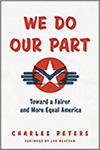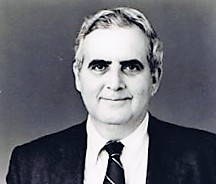New book by Charlie Peters, legendary Peace Corps Evaluation Director
For those who don’t know, Charlie Peters (PCW/staff 1961–65) put together the first self-evaluation unit in the federal government for the Peace Corps. It would develop by the government into the Inspector General’s Office that we have today. It grew out of an idea of another very early staff member Bill Haddad who told Shriver, as Coates Redmon relates in her book on the early days of the agency, Come As You Are, “Let’s get our own guys to go out there and find out what’s goin’ on, and if there’s something wrong, we’ll be the first to know and can correct it before the press gets onto it and starts screamin’.”
Charlie Peters was named head of the Evaluation Division, and known in the agency as “The burr under the saddle.” He hired first-rate journalists and writers, including Fletcher Knebel, Mark Harris, Richard Rovere, Calvin Trillin, James Michener, Stan Meisler, and RPCVs just home from overseas: Maureen Carroll (Philippines 1961-63), Dick Lipez (Ethiopia 1962-64), Peggy Anderson (Togo 1962-64).
Peters would leave the agency in the late ’60s and created the Washington Monthly and with this magazine pioneer explanatory journalism.
Charlie’s latest book We Do Our Part [Random House] will be published on March 7th and you can order it now on Amazon.com.
 “We Do Our Part” was the slogan of Franklin Delano Roosevelt’s National Recovery Administration —and it captured the can-do spirit that allowed America to survive the Great Depression and win World War II. Although the intervening decades have seen their share of progress as well, in some ways we have regressed as a nation. Over the course of a sixty-year career as a Washington, D.C., journalist, historian, and challenger of conventional wisdom, Charles Peters has witnessed these drastic changes firsthand. This stirring book explains how we can consolidate the gains we have made while recapturing the generous spirit we have lost.
“We Do Our Part” was the slogan of Franklin Delano Roosevelt’s National Recovery Administration —and it captured the can-do spirit that allowed America to survive the Great Depression and win World War II. Although the intervening decades have seen their share of progress as well, in some ways we have regressed as a nation. Over the course of a sixty-year career as a Washington, D.C., journalist, historian, and challenger of conventional wisdom, Charles Peters has witnessed these drastic changes firsthand. This stirring book explains how we can consolidate the gains we have made while recapturing the generous spirit we have lost.
In a volume spanning the decades, Peters compares the flood of talented, original thinkers who flowed into the nation’s capital to join FDR’s administration with the tide of self-serving government staffers who left to exploit their opportunities on Wall Street and as lobbyists from the 1970s to today. During the same period, the economic divide between rich and poor grew, as we shifted from a culture of generosity to one of personal aggrandizement. With the wisdom of a prophet, Peters connects these two trends by showing how this money-fueled elitism has diminished our trust in one another and our nation—and changed Washington for the worse.
While Peters condemns the crass buckraking that afflicts our capital, and the rampant consumerism that fuels our greed, he refuses to see America’s downward drift as permanent. By reminding us of our vanished civic ideal, We Do Our Part also points the way forward. Peter argues that if we want to revive the ethos of the New Deal era—a time when government attracted the brightest and the most dedicated, and when our laws reflected a spirit of humility and community—we need only demand it of ourselves and our elected officials.
With a new administration in Washington, the time is ripe for a reassessment of our national priorities. We Do Our Part offers a vital road map of where we have been and where we are going, drawn from the invaluable perspective of a man who has seen America’s better days and still believes in the promise that lies ahead.
The Peace Corps is one of Charlie’s examples.
We will be reviewing the book when it is available.

With all due respect I do not share the idea that Americans were more devoted to the commonweal 70 years ago than we are today. Most still look to improving their personal and family welfare before turning to attending to the needs of others. In this we are no different from most other people around the world.
More ‘dew’ than ‘due’ and way back 70 years must be about 1945 when the Japanese Americans were released from the camps (Topaz, Tule Lake, Manzanar, and several others). What lives we lead again and again and now I hear that some are suggesting that camps be reopened to load-in other suspected minorities who also do no harm but have the harm done to them.
Being able to track the impact of the Peace Corps/volunteer programs is important to ongoing funding and support for the PC as well as allowing us to improve the quality of it’s efforts–and one of the reasons that “The Towering Task” documentary on the Peace Corps is so important. From an individual PCV’s perspective determining one’s impact on those we serve and how they impacted us is a daunting task–I spent a good part of my soon to be released book, “Different Latitudes: My Life in the Peace Corps and Beyond” trying to analyze exactly that.